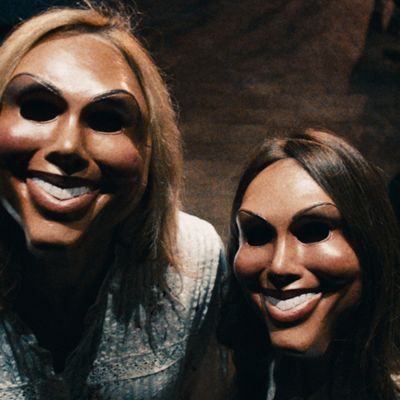
It turns out that all this nation needed was some bloodcurdling violence. In James DeMonacoÔÇÖs The Purge, weÔÇÖre told that America has been ÔÇ£rebornÔÇØ out of its doldrums thanks to the foresight of our New Founding Fathers, who established a tradition whereby, once a year, all crime is legal for one twelve-hour period. The film opens with a title announcing that now, in the year 2022, unemployment is at one percent (one percent!) and everybody is happy. ItÔÇÖs all thanks to ÔÇ£the Purge,ÔÇØ a joyous new holiday during which the haves settle into their heavily guarded houses behind their gated communities, turn on the TV, cook up some hors dÔÇÖoeuvres, and watch everybody else (the have-nots, mostly) rape, maim, and kill each other in a nationwide orgy of ritualized, soul-cleansing destruction. The holiday even has its own catchphrases: ÔÇ£Release the beastÔÇØ appears to be the most popular one.
Our heroes on this particular night are the very-well-off Sandin family, whose patriarch, James (Ethan Hawke), sells security systems, much of it to his possibly-maybe-somewhat-resentful neighbors in their pristine, gated community. Meanwhile, the kids, ultra-shy Charlie (Max Burkholder) and rebellious Zoey (Adelaide Kane), resent their family in their own ways. As the Sandins settle in for the Purge, calmly barricading their house, we begin to sense that things may be about to go a little wrong. For starters, ZoeyÔÇÖs boyfriend has snuck into the house and wants to ÔÇ£have a talkÔÇØ with Dad. Then, an unknown, bloodied black man (Edwin Hodge) comes screaming for help down the street, chased by an unseen mob ÔÇö and that little brat Charlie lets him in.
Look, we can pick holes in this setup all night long. (For starters, how exactly does this ÔÇ£PurgeÔÇØ work? Can bankers make off with everyoneÔÇÖs money during this period? Because, if so, the filmÔÇÖs ironclad portrayal of class could become very fluid, very quickly.) But why would anyone want to pick holes, when the premise makes for such a perfectly toxic confluence of family conflict, class war, and social collapse? The possibilities are endless. But DeMonaco stays focused on this small-scale story, and he wisely chooses tension over bloodbath, character over scale.
HereÔÇÖs what The Purge isnÔÇÖt: ItÔÇÖs not a nerdy, obsessive detailing of security systems and how they gradually break down, so donÔÇÖt expect Panic Room. And itÔÇÖs not a dystopian portrait of a world gone to hell, so donÔÇÖt expect a zombie movie. Rather, the film recalls the broad-strokes surrealism of a Shirley Jackson story, like that high-school standby ÔÇ£The Lottery.ÔÇØ Or, perhaps more appropriately, a Twilight Zone episode, like that classic ÔÇ£The Shelter.ÔÇØ
The latter influence becomes more prevalent when the mob chasing the SandinsÔÇÖ unnamed refugee finally shows up. TheyÔÇÖre an impeccably attired, preppy lot who just want to relieve themselves by killing ÔÇ£that dirty homeless pig who had the audacity to fight back.ÔÇØ Their leader is a polite, floppy-haired young man (Rhys Wakefield) wearing an insignia blazer, and it becomes clear pretty quickly that he and his gang are nuts ÔÇö the Manson Family by way of Brooks Brothers. They may not even be as well-educated as they seem. At one point, our chief villain, pleading to be given his prey, kills one of his own associates and then addresses the Sandins. ÔÇ£Give us he, or that will be thee,ÔÇØ he says, which IÔÇÖm pretty sure breaks any and all rules of dorky archaic-speak.
Our stupefaction and suspense do an intricate waltz while watching The Purge. Almost everything about the story is ridiculous, but DeMonaco pulls us in by beautifully building tension ÔÇö he mixes a surveillance-cam aesthetic with a handheld style that conveys just enough information while withholding much from our view. And every time the film threatens to get really dumb ÔÇö to drop the moral complication and just start blowing people away ÔÇö it resists. Well, for the most part. There are a few moments where the film does indulge our own bloodlust, but it pulls back just in time to make us self-aware. (I half-expected Russell CroweÔÇÖs character from Gladiator to show up at one point and yell, ÔÇ£Are you not entertaaaiiined?ÔÇØ) The Purge is not subtle. But why should it be? ItÔÇÖs not a movie about class or morality, but about the need for violence ÔÇö our own. We are the audience, after all, and we must be purged, too.


